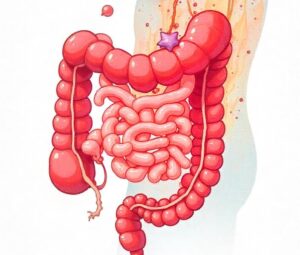Introduction to Diarrhea
Table of Contents
ToggleDiarrhea is a common gastrointestinal condition characterized by frequent, loose, or watery stools. It is a symptom rather than a disease itself and can result from a variety of underlying causes. Diarrhea can affect individuals of all ages and can range from mild to severe. Understanding the causes, symptoms, treatment options, and preventive measures for diarrhea is essential for managing this condition effectively.

Types of Diarrhea
Diarrhea can be categorized into several types based on its duration and underlying causes:
- Acute Diarrhea: This type lasts for a short period, usually less than two weeks. It is often caused by infections, food poisoning, or sudden dietary changes.
- Chronic Diarrhea: Chronic diarrhea persists for more than four weeks and may indicate an underlying health condition such as inflammatory bowel disease (IBD), irritable bowel syndrome (IBS), or malabsorption disorders.
- Osmotic Diarrhea: This occurs when there is an abnormal retention of water in the intestines due to the presence of unabsorbed substances, such as certain sugars or electrolytes.
- Secretory Diarrhea: This type involves the secretion of electrolytes and water into the intestines, often caused by infections or certain medications.
- Exudative Diarrhea: This occurs when there is an inflammatory process in the intestines, resulting in the secretion of mucus, blood, or pus in the stool.

Causes of Diarrhea
Understanding the causes of diarrhea is crucial for effective treatment. Some common causes include:
- Infections: Bacterial, viral, and parasitic infections are among the most common causes of acute diarrhea. Pathogens such as Escherichia coli, Salmonella, Norovirus, and Giardia can lead to gastrointestinal disturbances.
- Food Intolerances: Certain individuals may experience diarrhea as a reaction to specific foods or ingredients, such as lactose in dairy products or gluten in wheat.
- Medications: Some medications, particularly antibiotics, can disrupt the natural balance of bacteria in the gut, leading to diarrhea. Other medications, such as antacids containing magnesium, can also have this effect.
- Dietary Factors: A sudden change in diet, excessive consumption of caffeine or alcohol, and high-fiber foods can contribute to diarrhea.
- Chronic Conditions: Conditions such as IBD, Crohn’s disease, ulcerative colitis, and celiac disease can lead to chronic diarrhea due to inflammation and malabsorption.
- Stress and Anxiety: Psychological factors can also play a role in gastrointestinal health. Stress and anxiety can lead to functional gastrointestinal disorders, including diarrhea.
Symptoms of Diarrhea
The primary symptom of diarrhea is the presence of loose or watery stools. Other associated symptoms may include:
- Abdominal cramps: Cramping or discomfort in the abdominal area can accompany diarrhea, often due to increased intestinal motility.
- Urgency: Individuals may experience a sudden and strong need to have a bowel movement.
- Nausea and vomiting: Some individuals may also experience nausea, vomiting, or loss of appetite, particularly if the diarrhea is caused by an infection.
- Dehydration: Prolonged diarrhea can lead to dehydration, which is a serious condition that occurs when the body loses more fluids than it takes in. Symptoms of dehydration include increased thirst, dry mouth, fatigue, dizziness, and reduced urine output.

Diagnosis of Diarrhea
Diagnosing the cause of diarrhea typically involves a thorough evaluation by a healthcare professional. The diagnostic process may include:
- Medical History: The healthcare provider will take a detailed medical history, including the duration of diarrhea, associated symptoms, dietary habits, and any recent travel or exposure to contaminated food or water.
- Physical Examination: A physical examination may be conducted to assess hydration status, abdominal tenderness, and other relevant factors.
- Stool Tests: In some cases, stool samples may be collected and analyzed to identify the presence of pathogens, blood, or other abnormalities.
- Blood Tests: Blood tests may be ordered to check for signs of infection, inflammation, or dehydration.
- Imaging Studies: In chronic cases or when underlying conditions are suspected, imaging studies such as X-rays, CT scans, or endoscopy may be performed to visualize the gastrointestinal tract.
Treatment of Diarrhea
The treatment of diarrhea depends on its underlying cause, severity, and duration. Common treatment approaches include:
- Rehydration: The primary goal in treating diarrhea is to prevent dehydration. Oral rehydration solutions (ORS) containing electrolytes and sugars are recommended for mild to moderate cases. In severe cases, intravenous (IV) fluids may be necessary.
- Dietary Modifications: In mild cases, individuals may benefit from dietary changes. The BRAT diet (bananas, rice, applesauce, and toast) is often recommended for its blandness and ease of digestion. It is important to avoid fatty, spicy, or high-fiber foods during recovery.
- Medications: Over-the-counter medications such as loperamide (Imodium) can help reduce the frequency of bowel movements in mild cases. However, these medications should be avoided if diarrhea is caused by certain infections, as they may prolong the illness.
- Antibiotics: If diarrhea is caused by a bacterial infection, antibiotics may be prescribed. However, they are not effective against viral infections.
- Probiotics: Probiotics may help restore the balance of gut bacteria and promote recovery. They can be taken in supplement form or through fermented foods like yogurt.
Preventing Diarrhea
Preventive measures can help reduce the risk of diarrhea. Some key strategies include:
- Proper Hygiene: Washing hands thoroughly with soap and water, especially before eating and after using the restroom, can help prevent the spread of infections.
- Safe Food Practices: Ensuring that food is cooked thoroughly and handled safely can reduce the risk of foodborne illnesses. Avoiding raw or undercooked foods, especially in high-risk areas, is advisable.
- Safe Drinking Water: Drinking clean and safe water is crucial, particularly when traveling to areas with questionable water quality. Using bottled water or water purification methods can help.
- Vaccinations: Vaccines are available for certain infections that can cause diarrhea, such as rotavirus. Staying up to date with vaccinations can help prevent these illnesses.
- Managing Stress: Reducing stress through relaxation techniques, exercise, and mindfulness can help improve overall gastrointestinal health.
When to Seek Medical Attention
While most cases of diarrhea resolve on their own, certain situations warrant medical attention:
- Severe dehydration: Signs of severe dehydration include extreme thirst, dry mouth, dark urine, and dizziness.
- Persistent diarrhea: If diarrhea lasts for more than two days for adults or 24 hours for children, it is important to seek medical advice.
- High fever: A fever above 101°F (38.3°C) may indicate a more serious infection.
- Blood in stool: The presence of blood or mucus in the stool can signify a more serious underlying condition.
- Severe abdominal pain: Intense abdominal pain that does not improve may require further evaluation.
Conclusion
Diarrhea is a common condition that can arise from a variety of causes, including infections, dietary changes, and chronic health conditions. Understanding the causes, symptoms, treatment options, and preventive measures is essential for effectively managing diarrhea. While most cases resolve without complications, it is crucial to recognize when medical attention is needed to prevent dehydration and address any underlying health issues.
By practicing good hygiene, safe food handling, and stress management, individuals can reduce their risk of developing diarrhea. With appropriate treatment and preventive measures, most people can recover from diarrhea and return to their normal activities within a short period.


1 thought on “Understanding Diarrhea: Causes, Symptoms, Treatment, and Prevention”